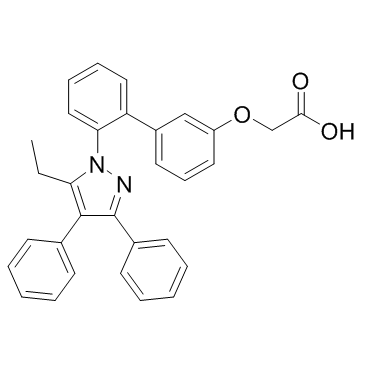| Description |
BMS-309403 is a potent, selective and cell-permeable inhibitor of fatty acid binding protein 4 (FABP4) with a Ki of less than 2 nM.
|
| Related Catalog |
|
| Target |
Ki: less than 2 nM (FABP4), 250 nM (FABP3), 350 nM (FABP5)[1]
|
| In Vitro |
BMS-309403 binds to FABP4 with high affinity and shows over 100-fold selectivity against FABP5 as well as the heart isoform FABP3[1]. BMS-309403 interacts with the fatty-acid-binding pocket within the interior of the protein and competitively inhibits the binding of endogenous fatty acids. Treatment with BMS-309403 significantly decreased MCP-1 production from THP-1 macrophages in a dose- and time-dependent manner[2]. BMS-309403 stimulates glucose uptake in C2C12 myotubes in a temporal and dose dependent manner via activation of AMP-activated protein kinase (AMPK) signaling pathway but independent of FABPs[3].
|
| In Vivo |
A 6 week treatment with BMS-309403 improves endothelial function, phosphorylated and total eNOS and reduced plasma triglyceride levels but does not affect endothelium-independent relaxations. In cultured human microvascular endothelial cells, lipid-induced A-FABP expression is associated with reduced phosphorylated eNOS and NO production and is reversed by BMS-309403[4]. The extent of atherosclerotic lesion area in the proximal aorta is significantly reduced in the BMS-309403-treated group compared with vehicle-treated controls in both the early and late intervention studies[2].
|
| Animal Admin |
Mice: To determine the effects of pharmacological inhibition of the actions of A-FABP, either the A-FABP inhibitor BMS-309403 (15 mg/kg) or vehicle (4% Tween 80) are administered chronically by daily oral gavage for 6 weeks in ApoE−/− mice (starting at weeks 12 of age). Mice are anaesthetized with a bolus injection of pentobarbitone sodium (230 mg/kg) and their aorta removed and dissected for further analysis[4].
|
| References |
[1]. Sulsky R, et al. Potent and selective biphenyl azole inhibitors of adipocyte fatty acid binding protein (aFABP). Bioorg Med Chem Lett. 2007 Jun 15;17(12):3511-5. [2]. Furuhashi M, et al. Treatment of diabetes and atherosclerosis by inhibiting fatty-acid-binding protein aP2. Nature. 2007 Jun 21;447(7147):959-65. [3]. Lin W, et al. BMS309403 stimulates glucose uptake in myotubes through activation of AMP-activated protein kinase. PLoS One. 2012;7(8):e44570. [4]. Lee MY, et al. Chronic administration of BMS309403 improves endothelial function in apolipoprotein E-deficient mice and in cultured human endothelial cells. Br J Pharmacol. 2011 Apr;162(7):1564-76.
|


